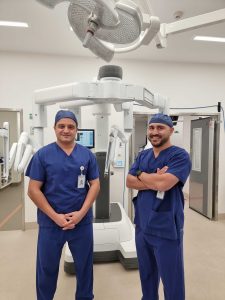Renal colic is a sudden and severe form of pain in the flank, caused by kidney obstruction. Often, renal colic is caused by an obstruction of the urinary tract by a kidney stone.
Renal colic is a sudden and severe form of pain in the flank, caused by kidney obstruction. Often, renal colic is caused by an obstruction of the urinary tract by a kidney stone.
Renal colic treatment is tailored to the severity of pain, underlying cause, patient’s overall assessment. The initial management is to alleviate the pain efficiently and then address the underlying cause.
Renal colic treatment: What is renal colic?
It is estimated that renal colic is experienced by 5-15% of the population most often due to a kidney stone. Renal colic, or acute kidney pain, is characterised by excruciating flank pain caused by a kidney stone blocking the urinary tract. Kidney stones form when minerals/salts in the urine clump together, creating crystals, which can then become lodged in the urinary tract. If a stone blocks the urinary tract and restricts the flow of urine, this can cause a build up of pressure and inflammation.
Kidney stones can form in the urinary tract for various reasons, including:
- Dehydration
- Excess calcium in the urine
- Excess protein in the diet
- Certain medications
- Hyperparathyroidism
- Some gastrointestinal conditions, such as Crohn’s Disease or ulcerative colitis.
Renal colic treatment is based on prompt and effective action to alleviate pain and prevent complications. The renal colic treatment approach that our urologists use encompasses various modalities that are tailored to the patient’s condition and stone characteristics.

Renal colic treatment: Immediate intervention
Immediate renal colic treatment usually focuses on pain relief and antiemetics (anti-nausea drugs) to address the acute pain and associated symptoms such as nausea. Nonsteroidal anti-inflammatory drugs (NSAIDs) and opiates are often at the cornerstone of analgesic (pain relief) therapy. NSAIDs are useful as not only do they alleviate pain, but they also reduce pressure in the kidneys, offering dual benefits.
Rehydration is also important during the immediate stages of renal colic treatment. Many patients become dehydrated due to vomiting or simply reduced fluid intake whilst they are feeling unwell.
Renal colic treatment: Dealing with the stone
The next phase of renal colic treatment is to begin the process of moving or removing the obstructing stone. Alpha-blocker medications like tamsulosin or nifedipine, can help with stone passage by reducing the pressure inside the ureters. While their efficacy varies between patients, they may be of benefit to patients with smaller, distal stones.
For impacted stones that require definitive management, more surgical procedures such as shock wave lithotripsy or ureteroscopy may be suggested by the urologist.
Your urologist may also recommend that a ureteric stent be placed. This will help to allow the urine to drain more freely and therefore assist with relieving the pressure in the urinary tract. Ureteric stents also prepare the ureter for a safe passage of a ureteroscope and lasering of the ureteric/kidney stone.
Renal colic treatment: Timely intervention is important
If you experience sudden, severe kidney pain, it is important that you contact your doctor right away, even if there is no blood in your urine.
Timely intervention is important in renal colic treatment, especially for obstructing stones. The sooner you seek medical help, the better chance you will have of reducing complications.
As part of your longer-term renal colic treatment, your urologist may recommend some dietary changes and increased fluid intake, depending on the types of kidney stones present.
Renal colic treatment: In conclusion
Successful renal colic treatment is based on a comprehensive approach that addresses pain relief, hydration, stone passage (or definitive interventions), dietary or fluid modifications, and possibly other preventative measures.
At Melbourne Urology Centre, our urologists are experts in renal colic treatment. They work closely with their patients to tailor an effective approach that alleviates symptoms, mitigates complications, and empowers patients in preventing stone recurrence.
